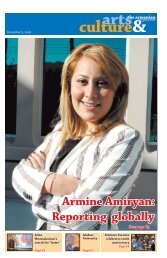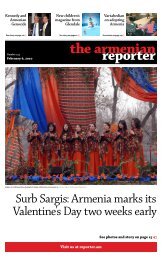Eastern U.S. edition - Armenian Reporter
Eastern U.S. edition - Armenian Reporter
Eastern U.S. edition - Armenian Reporter
Create successful ePaper yourself
Turn your PDF publications into a flip-book with our unique Google optimized e-Paper software.
The <strong>Armenian</strong> <strong>Reporter</strong> | July 18, 2009<br />
National<br />
Washington briefing<br />
by Emil Sanamyan<br />
U.S. sees Turkey, others<br />
as “emerging global<br />
powers”<br />
“America’s mission in the world today<br />
[is] to exercise American leadership<br />
to solve problems in concert<br />
with others,” Secretary of State<br />
Hillary Clinton declared as she<br />
outlined U.S. foreign policy priorities<br />
in a July 15 speech at the Council<br />
on Foreign Relations.<br />
Mrs. Clinton suggested that the<br />
United States was not concerned<br />
by what many U.S. experts see as<br />
the growing influence of regional<br />
powers, and she argued, “just as<br />
no nation can meet these [global]<br />
challenges alone, no challenge can<br />
be met without America.”<br />
“We will also put special emphasis<br />
on encouraging major and emerging<br />
global powers – China, India,<br />
Russia, and Brazil, as well as Turkey,<br />
Indonesia, and South Africa – to be<br />
full partners in tackling the global<br />
agenda,” Mrs. Clinton said.<br />
Last month, leaders of Brazil,<br />
China, India, and Russia, the so-<br />
Hillary Clinton.<br />
called BRIC countries, held an inaugural<br />
gathering in the Russian city<br />
of Yekatirinburg and pledged cooperation<br />
in challenging U.S. dominance<br />
in the world politics.<br />
Turkey, the only NATO member<br />
among the countries listed by Mrs.<br />
Clinton, has increasingly promoted<br />
policies that are frequently at<br />
odds with U.S. goals. Underscoring<br />
Washington’s interest in Ankara,<br />
both Secretary Clinton and President<br />
Barack Obama paid visits to<br />
Turkey within months of coming<br />
to office.<br />
“These states are vital to achieving<br />
solutions to the shared problems<br />
and advancing our priorities – nonproliferation,<br />
counterterrorism,<br />
economic growth, climate change,<br />
among others,” Mrs. Clinton went<br />
on. “With these states, we will<br />
stand firm on our principles even<br />
as we seek common ground.”<br />
Frank Pallone (D.-N.J.)<br />
Adam Schiff (D.-Calif.)<br />
Members of Congress<br />
raise concerns about<br />
Armenia-Turkey “roadmap”<br />
In a proposed letter to President<br />
Barack Obama, leading congressional<br />
advocates of <strong>Armenian</strong>-<br />
American issues charged Turkey<br />
with reneging on a commitment<br />
to normalize relations with Armenia<br />
and urged the administration<br />
“to separate the issues of<br />
normalization and genocide recognition.”<br />
The text of the letter, co-authored<br />
by Reps. Frank Pallone (D.-N.J.),<br />
Mark Kirk (R.-Ill.), Adam Schiff<br />
(D.-Calif.), and George Radanovich<br />
(R.-Calif.) was circulated on<br />
July 10 to secure additional congressional<br />
co-signers, according<br />
to an electronic copy shared with<br />
the <strong>Armenian</strong> <strong>Reporter</strong>. [See editorial,<br />
“Ask your representative to<br />
sign the letter on Armenia-Turkey<br />
relations.]<br />
Citing preconditions that Turkish<br />
leaders have repeatedly reiterated<br />
since the “road-map” for normalization<br />
was first announced<br />
on April 22, members of Congress<br />
argued that “Turkey, in an effort<br />
to block U.S. recognition of the <strong>Armenian</strong><br />
Genocide, agreed to a roadmap<br />
it did not intend to uphold.”<br />
The letter concluded with an<br />
expression of “hope that renewed<br />
efforts and focused resources from<br />
the Administration can be utilized<br />
to nurture the Armenia-Turkey<br />
Mark Kirk (R.-Ill.)<br />
George Radanovich (R.-Calif.)<br />
normalization process without preconditions<br />
and within a reasonable<br />
timeframe, and continue to remain<br />
strongly supportive of your stated<br />
campaign policy to officially recognize<br />
the <strong>Armenian</strong> Genocide.”<br />
Mr. Obama avoided using the<br />
term genocide in his April 24 statement,<br />
citing the joint statement by<br />
Armenia and Turkey made public<br />
two days earlier.<br />
ANCA denounces<br />
“pressure” on Armenia<br />
regarding Karabakh<br />
In a sign of further disappointment<br />
with the Obama administration’s<br />
Kenneth Hachikian<br />
policy on <strong>Armenian</strong> issues, the<br />
<strong>Armenian</strong> National Committee<br />
of America (ANCA) has expressed<br />
“profound disappointment” over<br />
what it termed “undue and unreasonable<br />
pressure being applied in<br />
a heavy-handed manner upon Armenia”<br />
by the United States, along<br />
with France and Russia, “to force<br />
unilateral and dangerous concessions<br />
by <strong>Armenian</strong>s regarding the<br />
Nagorno Karabagh conflict.”<br />
The July 14 letter by ANCA<br />
chairperson Kenneth Hachikian<br />
was the second such communication<br />
by the ANCA within two<br />
months. On May 18, Mr. Hachikian<br />
charged Barack Obama with<br />
a “grave offense” against <strong>Armenian</strong>-Americans<br />
over his failure<br />
to fulfill pre-election promises to<br />
recognize the <strong>Armenian</strong> Genocide<br />
and maintain U.S. support<br />
for Armenia.<br />
This week’s letter was in reference<br />
to a joint statement by the<br />
presidents of France, Russia, and<br />
the United States, issued on July<br />
10, which called on Armenia and<br />
Azerbaijan to agree to “basic principles”<br />
of a settlement, on terms that<br />
have been met with widespread<br />
criticism in Armenia.<br />
Erdogan sees “nearly<br />
genocide” in China<br />
Turkish prime minister Recep<br />
Tayyip Erdogan characterized recent<br />
clashes in China’s northwestern<br />
Xiniang province as “nearly<br />
genocide,” news agencies reported.<br />
The apparently ethnically motivated<br />
clashes between Han Chinese<br />
and Turkic Uighurs there last week<br />
left at least 156 people dead.<br />
Mr. Erdogan’s choice of words<br />
at the July 10 press conference<br />
contrasted with his repeated denials<br />
that deaths of more than a<br />
million <strong>Armenian</strong>s in Ottoman<br />
Turkey could constitute genocide.<br />
The comments came as Turkish<br />
nationalists held daily anti-China<br />
protests.<br />
The Turkish leader also promised<br />
to raise concerns over what many<br />
Turks see as Chinese oppression of<br />
Uighurs at the United Nation Security<br />
Council, where Turkey is currently<br />
a member.<br />
The comments have elicited criticism<br />
by Chinese officials.<br />
People’s Daily, the newspaper<br />
of the Chinese Communist Party,<br />
charged Mr. Erdogan with “twisting<br />
facts” and making an “irresponsible<br />
and groundless accusation.”<br />
A Chinese Foreign Ministry official<br />
was quoted as saying that the<br />
government was “following up on<br />
the reactions” from Turkey.<br />
Turkey agrees with<br />
Europeans over gas<br />
transit<br />
After months of disagreements,<br />
Turkey signed an agreement with<br />
Bulgaria, Romania, Hungary, and<br />
Austria to serve as a transit point<br />
for natural gas supplies to Europe,<br />
news agencies reported.<br />
The July 13 agreement removed<br />
a major roadblock toward the construction<br />
of what is known as the<br />
Nabucco gas pipeline, championed<br />
by the United States and the European<br />
Union as a way to ease Europeans’<br />
reliance on natural-gas supplies<br />
from Russia.<br />
By agreeing to the project in principle,<br />
Turkey is seen as favoring the<br />
West over the Russian-proposed<br />
South Stream pipeline.<br />
The gas is expected to come<br />
initially from Turkmenistan and<br />
Azerbaijan, as well as Iraq, whose<br />
energy sector was recently opened<br />
to foreign companies. Russia has in<br />
turn been seeking to buy up Central<br />
Asian gas to keep its dominant<br />
share of European markets.<br />
Russia is the world’s largest gas<br />
producer. Iran is the second-largest,<br />
but it has been largely shut out of<br />
European markets due to Western<br />
sanctions.<br />
U.S. Deputy Assistant Secretary<br />
of State Matt Bryza, who was<br />
present at the signing in Ankara,<br />
argued that the Nabucco line can<br />
be filled by Azerbaijan, Turkmenistan,<br />
and Iraq, without Iran taking<br />
part.<br />
f<br />
UNHCR inaugurates residential block for Iraqi refugees in Armenia<br />
by Anahit Hayrapetyan<br />
DARBNIK, Armenia – The United<br />
Nations refugee agency on July 3<br />
inaugurated a special residential<br />
centre for Iraqi refugees in the<br />
southern <strong>Armenian</strong> village of Darbnik.<br />
The building, a former agricultural<br />
college provided to the UN<br />
High Commission for Refugees by<br />
the government last year, features<br />
46 apartments and a social and recreation<br />
room. It was rehabilitated<br />
by UNHCR implementing partner<br />
YMCA/Shelter.<br />
At an opening ceremony attended<br />
by government officials,<br />
diplomats, local businesspeople,<br />
UN organizations, humanitarian<br />
aid workers, and refugees from<br />
Iraq, the UNHCR representative<br />
in Armenia, Bushra Halepota,<br />
thanked all those who had helped<br />
in the project and wished the new<br />
residents a dignified and happy life<br />
in Darbnik, which is located in the<br />
Ararat province.<br />
“A house is built by bricks, but<br />
a home and community are built<br />
by hearts and it is the close link<br />
with the community that will make<br />
this beautiful building into a happy<br />
abode for Iraqi families,” she said.<br />
Many UNHCR partners were involved<br />
in the project: the <strong>Armenian</strong><br />
government ensured that the building<br />
was linked to gas and electricity<br />
networks; telecoms company Viva-<br />
Cell-MTS provided some vital funding;<br />
and the United States Embassy<br />
has undertaken to supply furniture<br />
for the apartments.<br />
Hundreds of members of the <strong>Armenian</strong><br />
Apostolic Church, one of<br />
the world’s oldest Christian communities,<br />
have fled Iraq to escape<br />
sectarian violence in recent years.<br />
The majority were born in the Middle<br />
East nation.<br />
About 1,000 Iraqi <strong>Armenian</strong>s have<br />
been granted refugee or temporary<br />
asylum status in Armenia in the<br />
past four years. They live in rented<br />
houses in the capital, Yerevan, or in<br />
Ararat and Kotayk provinces.<br />
Most possess limited financial<br />
resources and are in urgent need of<br />
material assistance. They also find<br />
it hard to communicate in an unfamiliar<br />
dialect of <strong>Armenian</strong>, and<br />
face a major struggle to make ends<br />
meet in an alien land.<br />
The UN refugee agency, working<br />
through its local implementing<br />
partners, has been helping<br />
the most vulnerable families and<br />
promoting local integration of the<br />
refugees. The “Social House” in<br />
Darbnik is part of this program and<br />
addresses the most crucial need of<br />
the refugees – shelter.<br />
“VivaCell-MTS, as a corporate<br />
citizen, wants to contribute to this<br />
great program of housing, initiated<br />
by UNHCR,” said VivaCell-MTS general<br />
manager Ralph Yirikian, who<br />
took part in the ribbon-cutting ceremony<br />
with Deputy Prime Minister<br />
Armen Gevorgyan and others. “We,<br />
the <strong>Armenian</strong>s of Armenia, have to<br />
do our best to create the conditions<br />
for these people [Iraqi refugees] to<br />
stay and see their children’s future<br />
here,” he added.<br />
f

















